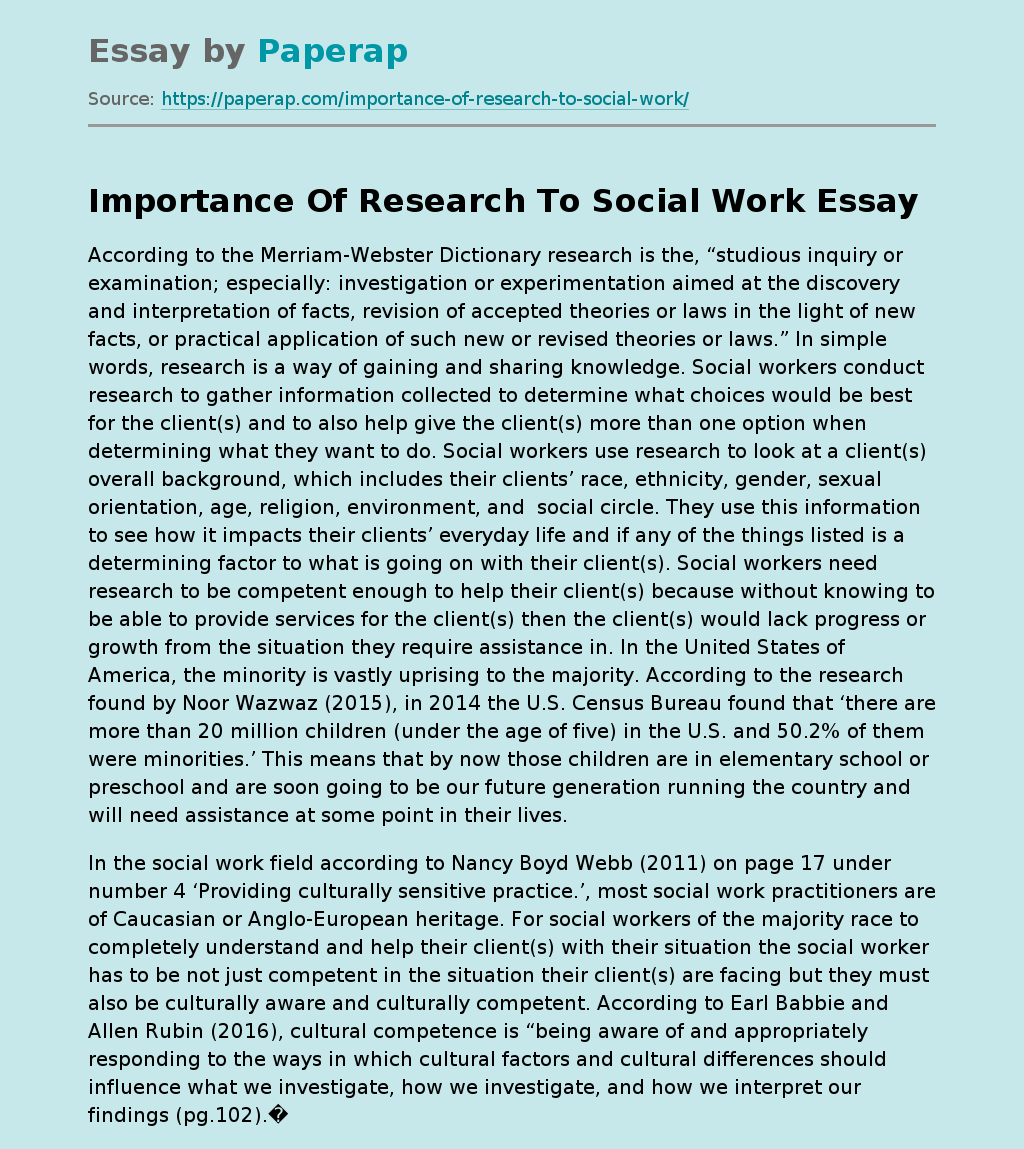Importance Of Research To Social Work
According to the Merriam-Webster Dictionary research is the, “studious inquiry or examination; especially: investigation or experimentation aimed at the discovery and interpretation of facts, revision of accepted theories or laws in the light of new facts, or practical application of such new or revised theories or laws.” In simple words, research is a way of gaining and sharing knowledge. Social workers conduct research to gather information collected to determine what choices would be best for the client(s) and to also help give the client(s) more than one option when determining what they want to do.
Social workers use research to look at a client(s) overall background, which includes their clients’ race, ethnicity, gender, sexual orientation, age, religion, environment, and social circle. They use this information to see how it impacts their clients’ everyday life and if any of the things listed is a determining factor to what is going on with their client(s). Social workers need research to be competent enough to help their client(s) because without knowing to be able to provide services for the client(s) then the client(s) would lack progress or growth from the situation they require assistance in.
In the United States of America, the minority is vastly uprising to the majority. According to the research found by Noor Wazwaz (2015), in 2014 the U.S. Census Bureau found that ‘there are more than 20 million children (under the age of five) in the U.S. and 50.2% of them were minorities.’ This means that by now those children are in elementary school or preschool and are soon going to be our future generation running the country and will need assistance at some point in their lives.
In the social work field according to Nancy Boyd Webb (2011) on page 17 under number 4 ‘Providing culturally sensitive practice.’, most social work practitioners are of Caucasian or Anglo-European heritage. For social workers of the majority race to completely understand and help their client(s) with their situation the social worker has to be not just competent in the situation their client(s) are facing but they must also be culturally aware and culturally competent. According to Earl Babbie and Allen Rubin (2016), cultural competence is “being aware of and appropriately responding to the ways in which cultural factors and cultural differences should influence what we investigate, how we investigate, and how we interpret our findings (pg.102).”
Social workers need to be culturally competent because it helps them to be able to help their clients by understanding what depth of issues or predicaments that their client(s) face daily. For example, the way a Caucasian male would feel would not be the same way an African American male would feel when a police officer would approach them, especially with everything that has been happening in today’s society. Being a social worker, you also have to be culturally competent when it comes to the environment where you work. For example, if you worked in the area surrounding Washington D.C., but then you got transferred to Farmville, Virginia, you would not have the same demographic of people which contributes to why you would not have the same resources available to provide to client(s) nor would the client(s) be able to retain the resources needed for their situation.
Research and cultural competence tie together because to have accurate data you need to take in all the factors that can apply to the client’s situation. Another reason these two things go hand in hand is how you can not do one without the other. For example, you cannot have cultural competence without researching the different cultures and you cannot research without including cultural competence into the mix to be able to give your client(s) the best resources that are accessible to them.
Research
- Babbie, E. R. & Rubin, A. (2016). Essential research methods for social work (Fourth ed.). Boston, MA: Cengage Learning Castle, R. (2000).
- Research and social work. Social Work Education, 19(5). Simmons, C., Diaz, L., Jackson, V., & Takahashi, R. (2008).
- NASW cultural competence indicators: A new tool for the social work profession. Journal of Ethnic and Cultural Diversity in Social Work, 17(1), 4-20 Wazwaz, N. (2015, July 06).
- It’s Official: The U.S. is Becoming a Minority-Majority Nation. Retrieved September 12, 2018, from https://www.usnews.com/news/articles/2015/07/06/its-official-the-us-is-becoming-a-minority-majority-nation WEBB, N. B. (2018).
- SOCIAL WORK PRACTICE WITH CHILDREN (Third ed.). S.l.: GUILFORD Research. (n.d.). Retrieved September 12, 2018, from https://www.merriam-webster.com/dictonary/research
Importance Of Research To Social Work. (2021, Dec 12). Retrieved from https://paperap.com/importance-of-research-to-social-work/

